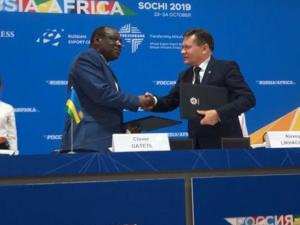
Inside Rwanda, Russia nuclear deal
Rwanda’s ambitions to adopt nuclear technology inched closer to realisation Thursday following the signing of an agreement with Russia for the establishment of a Centre for Nuclear Science and Technology in the country.
The pact was signed on the sidelines of the just-concluded Russia-Africa Summit in Sochi, Russia.
The agreement was signed by Minister for Infrastructure Claver Gatete on behalf of Rwanda and the Director General of Russian State-owned nuclear group Rosatom Alexey Likhachev.
The agreement lays ground for the establishment of Center for Nuclear Science and Technology (CNST) with the latest technology of a 10 MW pool- type reactor in Rwanda.
Going by the agreement, the centre will feature six multi-purpose sections; Research Reactors and Lab Complex, Centre for Nuclear Medicine, Multipurpose Irradiation Center, and Radiobiology Laboratory and Greenhouse.
Other sections will include Education and Training Complex and Radiation Material Science Complex.
The selection of the six laboratories of the centre follow consideration on ensuring impact on key sectors.
The sectors to be impacted by the development include medical research, energy, agriculture, security, industry and exploration, education, geology and the environment.
The cost of the centre is still undisclosed.
How we got here:
In May this year, Rwanda and the Russian State-owned nuclear group signed a roadmap for establishing Russian-Rwanda cooperation in the peaceful uses of atomic energy.
The roadmap outlined action points within the course of the year which culminated in yesterday’s signing of the pact.
In December 2018, Rwanda and Russia signed an Inter-Governmental Agreement (IGA) on peaceful uses of nuclear energy in Moscow.
Around 2011, Rwanda enlisted as member of the International Atomic Energy Agency (IAEA) with an aim to achieve safe, secure, and peaceful use of atomic energy.
Training local experts:
In the build-up to yesterday’s signing, Rwandan technicians have received training on a range of aspects such as international legal framework, nuclear safety, security, transportation of radioactive material and civil liability for nuclear damage among other subjects.
The trainings have been conducted by world-renowned bodies such as International Atomic Energy Agency (IAEA).
Rwanda’s Legal framework
Rwanda adopted a national legal framework in 2017 by enacting a law on the use of nuclear energy and has since moved to raise awareness about the use of nuclear technologies.
The objective is to have the Centre for Nuclear Science and Technology by 2024.
